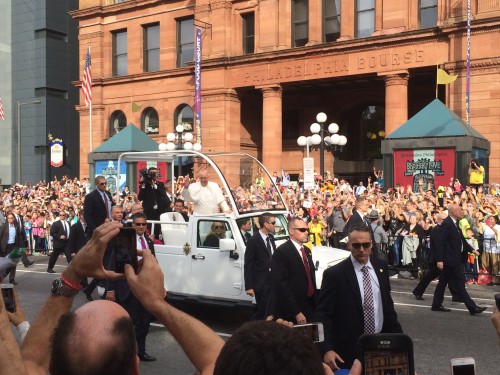
When it was announced last fall that Pope Francis would be visiting the U.S., DePaul student Griffin Hardy saw an opportunity.
A Catholic studies major, Hardy wanted to research the relationship between American Catholics and the Papacy, and after talking with advisors, he was given the support to pursue his project.
A year later, Hardy found himself pressed against the barricades outside Independence Hall in Philadelphia, watching as Pope Francis waved at the crowds in his popemobile only 25 to 30 feet away.
Francis landed for his first visit to the U.S. in Washington, D.C. Sept. 22 and continued on to New York and Philadelphia over the course of the week, ending the visit at the World Meeting of Families to reinvigorate Catholic family values. Thousands made the trek across the country and the world to catch a glimpse of the pope. Seeing the pope, Hardy said, “(is) a hard feeling to describe.”
“(There is) an inner feeling of peace,” Hardy said. “I think he is an independent person, and very gentle…(Francis) is somebody who is loved by so many different people.”
Hardy saw the pope’s speech in Independence Hall during the World Meeting of Families, where Francis spoke in Spanish on immigration. Hardy said the speech was “emotionally charged” and “powerful to hear.”
“I think with Pope Francis in particular, he’s quickly become an extremely import world figure,” Hardy said. “I think that part of why people appreciate him so much is that he is not coming from a perspective of trying to advance the interests of the country. Most world leaders advance country. That’s not what the pope is doing.”
DePaul students in Catholic Campus Ministry (CCM) also paid close attention to the visit, in particular hosting a watching party for Francis’ address to a joint meeting of Congress.
The address was the first in American history, and many watched to see what he would say during a time of deep divisions in U.S. politics. The content the pope chose to speak about was not surprising to many, who have been watching him since the decision of the papal conclave and who know that this pope has taken a more radical stance compared to previous popes.
Fr. Jim Osendorf, C.M., spoke of the pope’s simple statements and how they contributed to the message overall.
“It was very inspirational. He spoke simply,with simple terms and simple words, and yet, in that simplicity, he tried to invoke the best that’s within us,” Osendorf said. “I was moved emotionally much more than I thought I would be.”
[box]Read more of our coverage of Pope Francis’ visit to the U.S.[/box]
The main facets of the speech were about immigration, climate change and how the U.S., known as the world’s most influential nation, could help address problems seen in the world community.
Osendorf said the emotion he feels about the way the U.S. has become mirrors the show “Survivor,” in the cutthroat tactics the nation uses to outwit and out do others. He said it is pushing away other nations.
The pope laid out a plan for a better world, addressing climate change, helping immigrants and refugees and economic issues. These three main topics were expected. The pope has often called for changes in the global community’s approach to climate change as well as to the current refugee crisis, and the latter sparked nations including Germany and the U.S. to raise the numbers of refugees they will accept over the course of the next few years.
To Mark Potosnak, an environmental studies professor and the Catholic Climate Change ambassador for the Catholic Climate Covenant, the pope’s address was an opportunity to focus on commonalities.
“(It’s a) great opportunity for politicians of all perspectives to begin to see commonalities on issues such as climate change and immigration,” Potosnak said. “Instead of an intrusion into partisan politics, the pope’s message will focus on the moral issues and values that the vast majority of Americans hold in common.”
Along with the focus on things in common, the pope repeated the phrase “common good” often throughout his speech. This could imply that, though there are differences between the U.S. and other nations, those rivalries must be put aside to make the world a better place.
“I think, overall, it was a careful and well considered address,” Catholic studies and political science professor Michael Budde said. “He was sensitive to the interests of his many audiences talking to politicians, Catholics and people who are curious but aren’t religious. There were a lot of objectives to consider; overall it would be hard to imagine him doing better.”
Francis also employed the backstory of America, pointing to the storied glories of times past and reassuring representatives and senators alike that something akin to that — without the imperialism, the slavery and the other blotches on the record — was still possible.
Overall the pope was well received in the country, both by citizens and the world beyond. And one of the most worthwhile moments of his trip, Hardy said, was meeting the many diversified “people of God,” with their different cultures and backgrounds gathering as a collective community.

